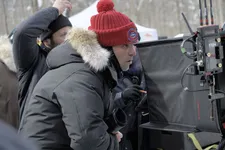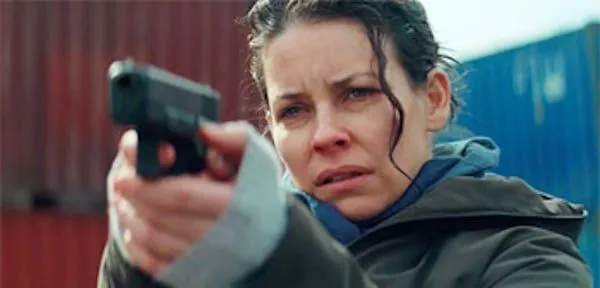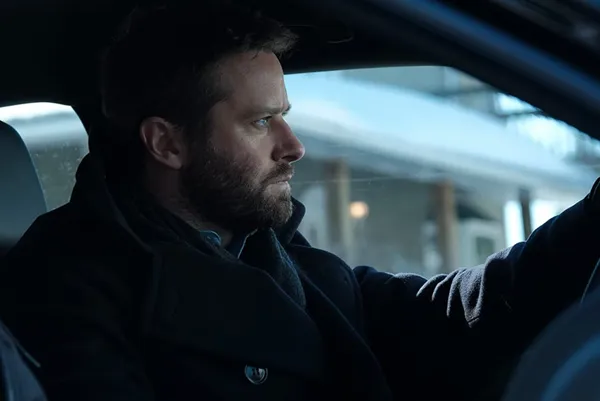 |
| Gary Oldman in Crisis. Nicholas Jarecki: 'I thought there was a lot of explosive energy with this cast that could generate good thriller tension' Photo: Quiver Distribution |
Writer/director Nicholas Jarecki isn’t scared to tackle hot-button issues. His debut fiction feature, Arbitrage took on the complexity of hedge-fund malfeasance and, now, almost a decade later, he’s back with Crisis, a multi-strand film that considers the pharmaceutical drugs crisis in America. In one plot arc, FDA agent Jake (Armie Hammer) is working on a major drugs sting, a complex situation that will lead his path to cross that of grieving mum Claire (Evangeline Lilly), who is taking the law into her own hands to find out what happened to her son. Elsewhere, a college professor (Gary Oldman), who has spent his career rubberstamping tests for Big Pharma discovers the latest opioid in his lab may not be the wonder drug it is claimed to be.
 |
| Eugene Jarecki behind the camera on Crisis |
On the suggestion that this is a timely subject, Jarecki says: “I think every creative person in some way is doing something that reflects the time that they're in, even if it's like, Breughel or some Old Master - it wasn’t old when they did it. I don't like to call myself an artist, but a creator is striving to somehow reflect.
“I really like David Mamet, he said that the reason that an artist creates is because they feel an imbalance within themselves. And the act of creation restores the personal balance and thus brings them happiness, until a while goes by, and then they start to feel an imbalance again, and then that's why they have to make yet another work. And so this is the cycle of the creative person.
“And I think, for me, the imbalance that I feel is usually having something to do with the abuses of power or a society in crisis, I guess. I like to reflect the time, I like to reflect what's going on, because I think we all react to it personally. And if art is personal in some way. Or if you call film an art, it's a reflection of what we are going through as the audience because, ultimately, a film doesn't live without an audience. So I am attracted to those films that are placed within some type of moment.”
The New Yorker adds: “That doesn't mean they can't be classic. I’m not comparing Crisis to Casablanca, but you look at Casablanca, and it's one of my favourite films, and it's very reflective of Nazi occupation, Allied France, what was going on between men and women, the dynamics and strong female characters. I mean, these were all the great themes of 1941. So I think there is a school of filmmaking that holds a mirror up to society. And in my case, I like to say, ‘Hey, guys, what the hell's going on?’ Of course, the risk with taking on a hot-button subject is that the news cycle can be very short in the modern world – although the opioid crisis shows no signs of leaving the headlines – and that can put added pressure on a filmmaker to get things done. Jarecki says that, in fact, he and British star Oldman were working on another film when they decided to change tack.
After writing the script in about six months, he says he showed it to Oldman, who agreed that the subject was urgent. Jarecki adds that he was keen to put all this consideration of opioid manufacturing, government safeguards and abuse into “a nice thriller package”.
The end result comes at the subject of pharmaceutical drugs and abuse from different angles – something that has led the film to be compared to the likes of Traffic. While Jarecki says he believes Traffic is a great film, he adds: “This, this concept of multiple storylines, intersecting storylines is not a new idea. I mean, Robert Altman invented this, right, with Nashville, and with these wonderful films of the 70s. So there's a rich tradition of this multiplex storytelling, and I think it's kind of fallen out of favour. I think that's because of the rise of television. So people are very used to consuming that on the screen, and then you don't really see but I mean, you had this in LA Confidential and 21 Grams was also a three-story movie. “I love that film. I mean, it's so funny, because both Traffic and 21 Grams are multi-plot drug movies and they both star Benicio Del Toro. So you had you had more of this in the late 90s, early 2000s. And some great directors like Iñárritu, Curtis Hanson, and Soderbergh dealing with these themes. And then Altman continuing to do it for many years, and indeed other filmmakers, Henry Jaglom’s a lesser known one, so it was a popular form. And I always loved those movies. So I thought, ‘Boy, it's kind of time for one of those’.
The other thing that a multi-strand plot offers is an opportunity for a broad ensemble cast rather than just one or two leads.
“I'm drawn to these actors,” says Jarecki. “I think you can see here with Oldman, Hammer, Evangeline, Michelle Rodriguez, Veronica Ferres, I like these actors who are a little bit on the edge themselves. They're kind of anti-heroes, and they bring a dynamic excitement to the film. So I just, I thought there was a lot of explosive energy with this cast that could generate good thriller tension. I mean, ultimately, a thriller is all about tension. And I think this film delivers that.”
Jarecki says that when he writes he doesn’t have the actors specifically in mind but he starts to think about when he is shooting the movie. Lilly, in particular, has to deliver a strong performance as a lot of what her character is experiencing is emotions that she is going through alone. Jarecki says he was a “super-geek” fan of Lost.
He adds: “What I liked about her as an actor, is on Lost she really she had 100 or more episodes to show every possible emotional permutation. I thought I hadn't seen her do that in film - she had done a small role in The Hurt Locker, and more in the commercial realm with the MCU, Ant Man, and I like those films and she's a great presence - but I knew there was something more there available.”
“American culture, it's a bit it's a big boom and bust. So I think the desire for a magic pill or an easy solution to things, that's very American. We have to explore, what is the cost of not really overseeing these things? What is the cost of an optimism that's too strong?”
Jarecki says he deliberately cast Luke Evans and Veronica Ferres as the drug company employees as they are “really appealing, sympathetic actors”. He said he wanted to give the Big Pharma element of the story a “reasonable argument for what they were up”. He adds: “I don't think anyone thinks they're a villain. They're like the hero of their own story. So they're sitting over there saying, ‘No, don't you see, we're making progress. You know, in order to make progress, you’ve got to keep moving forward’. And, and that was important for me to do rather than doing some kind of moustache-twirling thing.”
The complexity of the situation is most reflected in Oldman’s storyline, which sees his professor trapped in the middle a moral maze that he has partially helped to construct but which he doesn’t see until it’s too late. Jarecki says: “I like the idea of a man who maybe has participated in the system himself, and maybe has benefited from it. And he has a crisis of conscience, where he sees something that is just too powerful to ignore and he can't look away any more. I think that's really what this particular epidemic is about. It's a very dangerous substance. The other thing we wanted to do with this film was just to increase the discussion around awareness of treatment, and the destigmatisation of the addict, because I think there's been this idea, ‘Oh, it's the street people. It's the low people. They're the ones in the drugs’. And, you know, now we see it crosses over to all walks of life. And it's your your brother or your sister, your friend - and your friend is not a bad person, your sister is not a bad person. No, they're a person who is caught up in something, and who has a problem and needs help.”
He hopes that the genre elements will help the film to reach a wide audience, adding: “I think there's a danger of getting into an echo chamber, where just like, ‘Oh, I'm making a film for some liberal elite, blah, blah’. Film is an amazing medium that has the power to reach so many. First it has to function as a film, it has to function as a thriller. Does it entertain you? Then if it provokes some questions in debate, I think that's a secondary satisfaction for its creators. So hopefully, the film, just get people talking, get people aware of these issues. And maybe see if they want to do something about them.”
Crisis is currently available to stream in the US and is scheduled for UK release later this year























